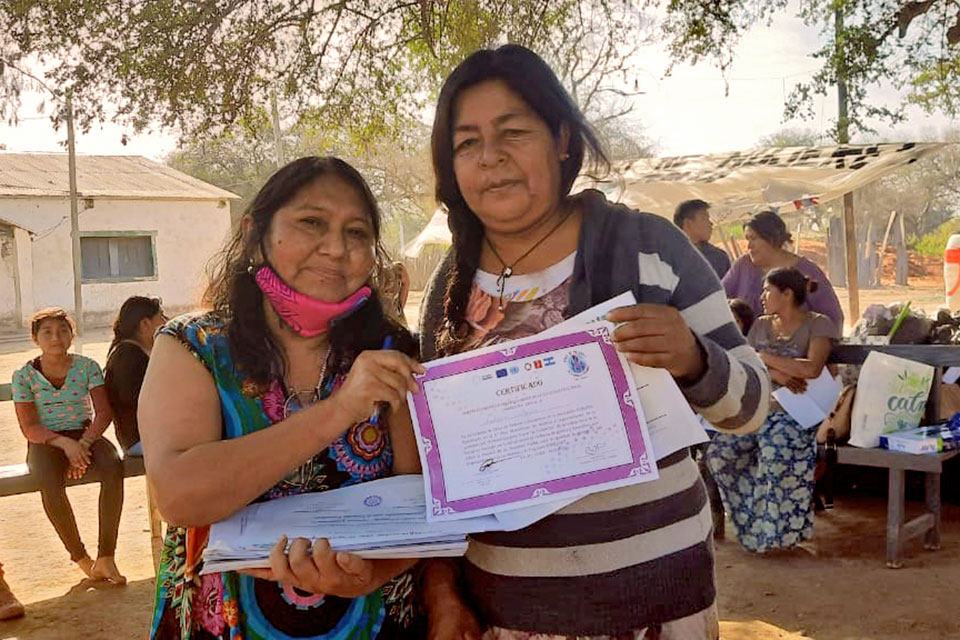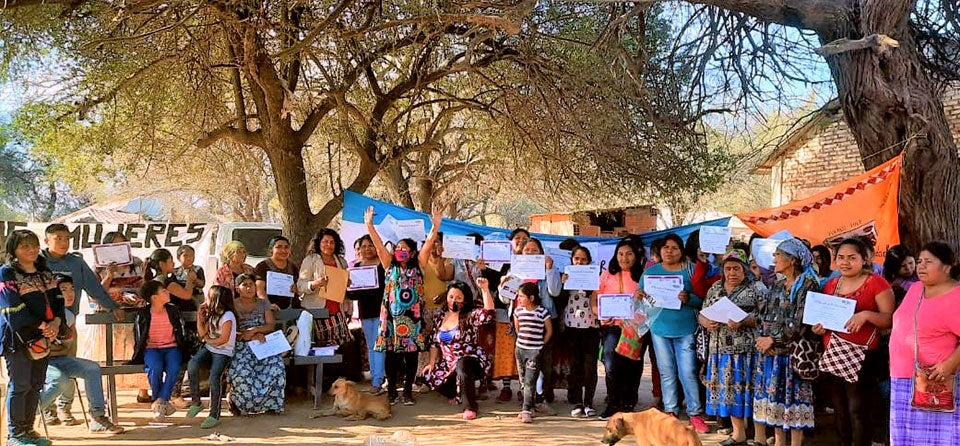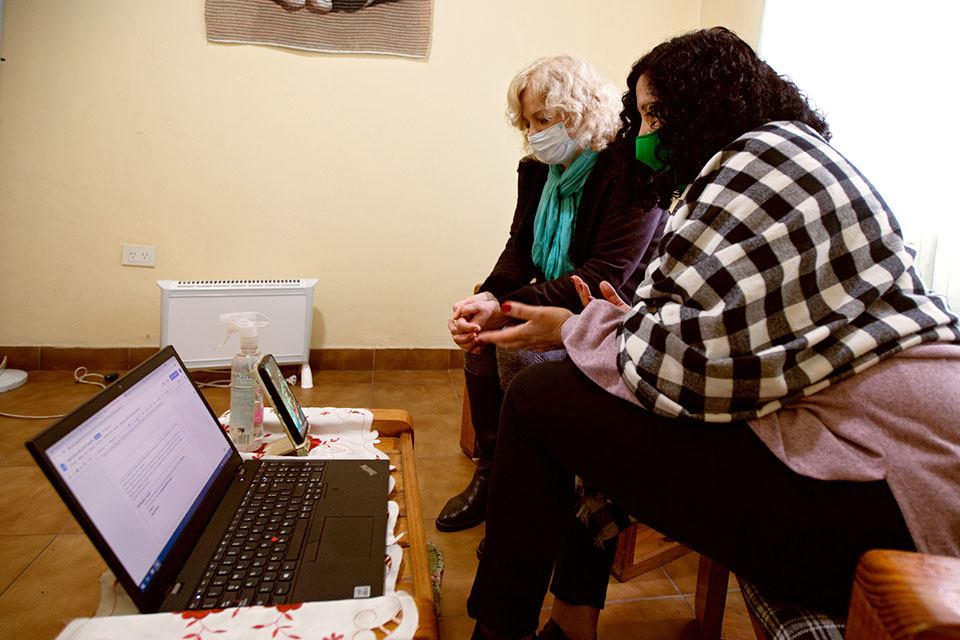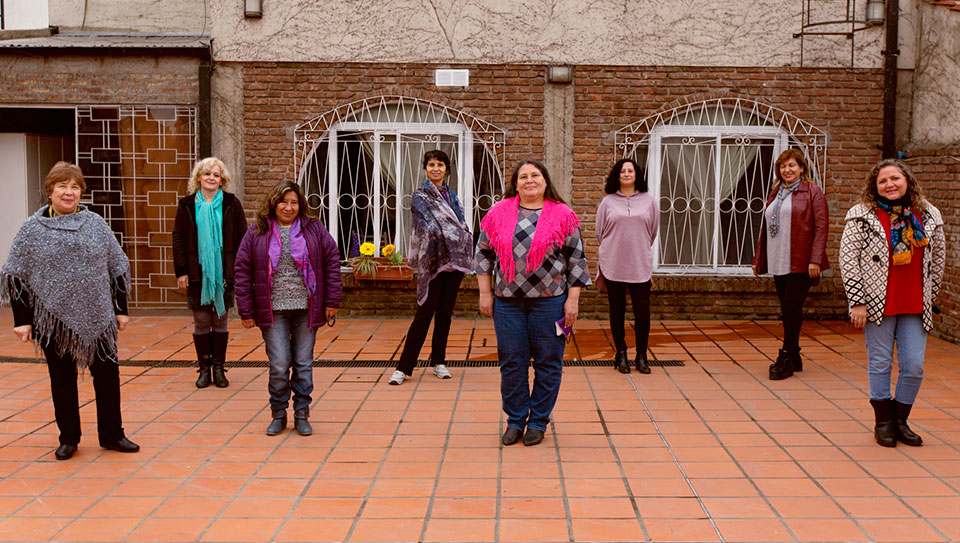Supporting rural and Indigenous women in Argentina as gender-based violence rises during the COVID-19 pandemic
In the wake of the COVID-19 pandemic, femicide is on the rise in Argentina, and Indigenous and rural women who experience violence face multiple barriers to accessing the services and support they need. But the country’s civil society and women’s organizations are determined to prevent and respond to violence against women and girls, even in the most challenging of circumstances.Date:

Irene Cari (pictured at left), leader of Foro de Mujeres por la Igualdad de Oportunidades, awarding certificates of completion to the Indigenous women who took part in the trainings sponsored by Spotlight Initiative. Photo courtesy of FOMUPIO/Irene Cari.
“Now, women in the communities know people care about them. Their voices can be heard, even if they are too shy to speak up in Spanish, a language that is not fully theirs,” explains Irene Cari, leader of Foro de Mujeres para la Igualdad de Oportunidades (Women’s Forum for Equal Opportunities), as she describes the impact of bilingual training sessions about violence prevention that the organization recently held in Indigenous communities in Argentina, supported by the UN.
“Rural and Indigenous women face significant challenges in accessing services and defending their property. In general, even though women work the land, they do not own it. Men do. This limits a woman´s autonomy, which is often a key factor in situations where violence emerges,” continues Cari.
“Getting information in their own languages is one of the many challenges that Indigenous and rural women are facing during the COVID-19 pandemic. Information to prevent the spread of the disease, and access health and other services, is distributed only in Spanish. This creates a barrier for Indigenous people.”
Women supporting women
In the wake of the COVID-19 pandemic, femicide is on the rise: The Latin America region is home to 14 of the 25 countries with the highest rates of femicide in the world. In Argentina, according to the Women’s Office of the Supreme Court of Justice, one woman is killed every 32 hours. In March 2020, due to the spread of COVID-19, the Government of Argentina imposed a strict nationwide lockdown that lasted for nine months, and the number of femicides steadily increased while woman were trapped with their abusers.
In response, UN Women, as part of the multi-year EU-UN Spotlight Initiative to Eliminate Violence Against Women and Girls, established a small grants programme in Argentina to develop and strengthen the capabilities and resources of civil society organizations working on ending gender-based violence.

Women and girls from the Wichí Indigenous communities of El Carboncito in Salta Province pose with their certificates of completion from the trainings sponsored by the Spotlight Initiative. Photo courtesy of FOMUPIO/Irene Cari.
It was through this programme that Foro de Mujeres para la Igualdad de Oportunidades was able to conduct the bilingual training sessions in the Wichí Indigenous communities of El Carboncito in Salta Province. The initiative, and the women that run it, provide shelter and essential services for women and girls who experience violence. More than 30 women took part in the training, and learned about how to report gender-based violence, resources for accessing services and developing skills for violence prevention.
“Each training session was unique. The women waited for us with maté, a traditional beverage, and shared their stories. Their rhythm is very different from women in the urban areas – they speak slowly and take their time to share their thoughts,” says Cari. “As Indigenous women, we are the primary defenders of our lands. We promote community-based feminism because we know that even though our voices have been silenced at times, our role in our communities is key.”
According to official data, eight per cent of the population in Argentina live in rural areas, and just over two per cent, approximately 955,000 people, of the total population is identified as Indigenous. Over six per cent of the population of Salta Province is identified as Indigenous, triple the national average.
“Supporting rural and Indigenous women is a core component of the Spotlight Initiative,” says Carla Majdalani, Spotlight Specialist for UN Women. “Historically, Indigenous and rural women have faced multiple and intersecting forms of discrimination and violence, and multiple barriers to accessing quality services when they do experience violence. It was important that the small grants programme reached women in these communities.”
Finding new ways to help
The small grants programme also supports women and girls in urban areas who are facing their own challenges due to the pandemic. Through the Spotlight Initiative, in the city of Moreno, UN Women funded Fundación Espacio de Mujer (Women’s Space Foundation) to provide virtual assistance to women and girls who were experiencing violence during COVID-19 lockdown.

A lawyer and a phycologist at Fundación Espacio de la Mujer provide counseling to women through video calls during COVID-19 lockdowns in the city of Moreno. Photo: UNIC Buenos Aires.
The NGO purchased mobile phones to expand its counselling service, and developed a training for front-line workers on how to provide essential services to survivors online. The online training addressed topics such as prevention of child abuse, strategies for reaching out to women suffering gender-based violence, and step-by-step guidance on how to report violence.
“The Spotlight Initiative provided us with the opportunity to continue our work during the pandemic and to help women [survivors] to overcome difficult situations during the lockdown,” shares Gladys Villalba, Programme Coordinator for Fundacion Espacio de Mujer.

The counseling team of experts at Fundacion Espacio de la Mujer in Moreno. Photo: UNIC Buenos Aires.
“The pandemic is ongoing, and many NGOs and women’s groups are going to have to find new ways to help women and girls as the situation evolves,” said Majdalani. “Our collaboration with civil society organizations and local women’s groups will be vital as we continue efforts to end femicide in Argentina in the years ahead.”
The Spotlight initiative is working to end femicide in Argentina by implementing strategic interventions that prevent gender-based violence and ensure access to justice and holistic services for survivors across the provinces of Buenos Aires, Jujuy and Salta. It is also strengthening key institutions involved in the national fight against femicide, and liaising with artists, influencers and athletes to promote gender-based violence prevention in different settings and groups.